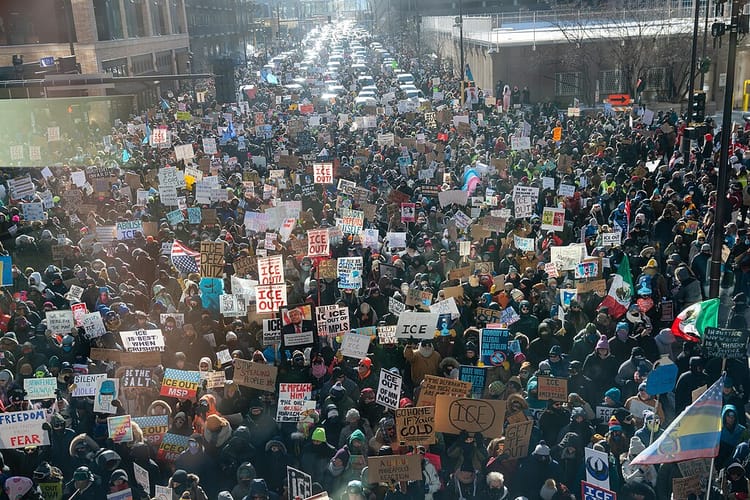Accountability Must Be The First Climate Solution

Like a lot of people in the climate space, my mind has been spinning this week as I've watched images of the entire world reeling from intense heat, flash floods, wildfires and other climate-change-intensified extreme weather events, interspersed with a sudden deluge of denialism, new and old. At the same time, I happen to be researching both the fossil fuel industry's role in expanding legal protections for "corporate free speech," which it's now trying to extend to fraud, and its role in criminalizing and otherwise suppressing actual free speech around the world. It has me thinking about something I've been on my damn soapbox about for years: accountability isn't just "a" climate solution, it actually has to be the first one. How in the world do people expect any of the other solutions to work without that one coming first?
If fossil fuel companies and other polluting industries are allowed to continue to mislead the public, extract from the public, and impose their costs on the public, how will any proposed solution actually manage to solve anything? What's happening with the IRA is a really good example. It's moving the needle in a big way on the electrification of transportation and the shift toward renewable energy. But it's also sparked an absolutely enormous wave of disinformation and obstructionism, from fake activist groups battling wind farms (supposedly on behalf of whales but actually on behalf of fossil fuel companies) to old-guard climate denialists like Steve Milloy making the rounds on all the conservative talk shows to tell people that everything from wildfire smoke to extreme heat is perfectly normal...healthy even! Their efforts include a very effective re-labeling of gas as "clean energy" and the positioning of various fossil-fuel-friendly non-solutions, from waste incineration to bogus carbon capture tech as part of the transition. They seem to be pushing for a future in which for every dollar that actually moves us away from fossil fuel dependence there's one (or more!) that keeps us from moving on at all.
Electrification is another good example. Many in the climate space are so terrified of disinformation taking hold that they are unwilling to even entertain a conversation about how we might approach lithium mining more equitably than we have oil drilling, never mind how we might reduce car dependency across the board. With zero accountability for either the automotive or the fossil fuel industy, they're left to do what they've alway done: prioritize profits over public health, environmental sustainability, or the equitable treatment of workers. Rather than re-train auto workers to participate in the new EV economy, automakers are hiring new people they can pay less and looking to move to right-to-work states where they won't have to deal with unions. A move that will no doubt be vaguely blamed on "climate activists" or "climate policy" because we still haven't held the people actually to blame—extractive industries and the executives directing them—responsible in any way.
Hundreds of climate cases are currently trying to do exactly that. To combat them, industry is pulling out all the stops: painting the litigation as being driven by money-grubbing lawyers, arguing that evidence-based accusations of fraud are actually attempts to censor companies, cranking up the propaganda machine, and doing everything they can to lock in as much fossil fuel use as possible for the next few decades. All while looking for every possible way to discredit and suppress climate activists.
Oil companies' arguments in court today hinge entirely on the work they've done to help create the concept and legal protection for corporate personhood. They are counting on the rights of personhood to deliver them from tens of millions of dollars in damages. But if they want the rights of personhood, they must also accept the responsibilities: consequences for bad behavior, requirements to change that behavior, and an obligation to consider the common good.
Those of us who see accountability as a critical climate solution are often accused of being a hammer that sees all oil companies as nails, righteous zealots seeking only to blame and punish. That's not it at all. We are, above all, pragmatists who know that bad behavior, especially if it's profitable, never changes absent consequences. Any parent could tell you that, and frankly so could any human. When have you ever seen someone who consistently benefits from and gets away with treating others poorly have a sudden, voluntary change of heart and course correct? That goes double for companies, which are not, despite their loud protest to the contrary, people.
Petroganda: A Return to the Original Story
From Exxon's "break free" ad to BP's "Investing in America" campaign, Chevron's "Energy in Progress" spots to API's "the solution to everything is more oil and gas" Out Here campaign, the industry seems to have coalesced around a new story that's actually a very old one. These ads focus on a combination of energy security and nationalism that has been the narrative foundation of the industry for more than a century. They remind us that we need energy now (especially to move around--energy allowing us to move is a big theme in all of these), and that the more American energy we make, the better for everyone. Who could argue with that except someone who's anti-American? There are still the occasional old-school greenwashing ads, sure. Chevron loves to talk about "carbon intensity" and "renewable biogas," for example. But for the most part, the industry seems to have stopped trying to convince us that it's part of the solution (hard to do with BP, Exxon, Total, and Shell all walking back climate commitments in recent months), and gone back to reminding us that we need it and should be greatful for it.
In the Petroganda section of the newsletter, on Instagram, and, soon, on our website, we'll keep you posted on extractive industries' ever-changing PR techniques and narrative shifts.
This Week's Climate Must-Reads
- "He lived to be outdoors, even in extremes like Death Valley. He died doing what he loved," A moving story by Hayley Smith and Francine Orr for The Los Angeles Times of the second official heat related death in the park this year (both occurred this month).
- "Environmental warfare is the colonizers favorite tool." When news of the coming heat wave reached NBC Universal execs in LA they appear to have taken the depraved yet rather predictable step of trimming the trees where WGA and SAG-AFTRA members were striking, depriving the striking writers and actors of shade. Reporters confirmed that no permits were pulled to trim the trees outside Universal's gates, and the job was done quickly and sloppily. In the Heated newsletter, Emily Atkin reminds us (with a hat-tip to Amitav Ghosh and his book The Nutmeg's Curse) that this is sort of environmental warfare is a classic tool of oppression.
- "America's Deadly Heat Isn't (Officially) a Major Disaster" The always-great Kate Aronoff reports on why the federal government doesn't recognize extreme heat as a major disaster, and what it might mean if it did.
- Sam Bankman-Fried Wanted to Buy the Nation of Nauru To Wait Out the World's End - Another day another story of a "genius" whose plan for the future is to wait out apocalypse in their bunker. Faustine Ngila has this wild story for Quartz.
- Is Big Oil Turning on Big Auto? Last week our "Petroganda" section focused on Exxon's new campaign, which seems distinctly anti-electrification. I wrote about that shift and what it might mean in a whole lot more detail for The New Republic this week.





